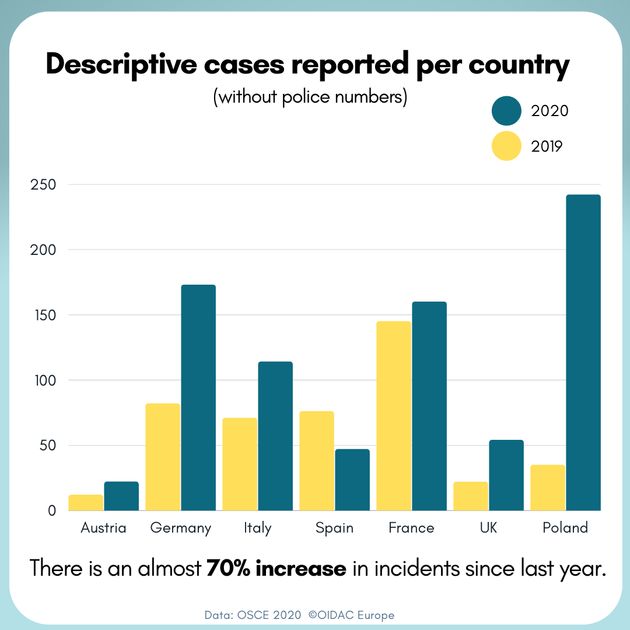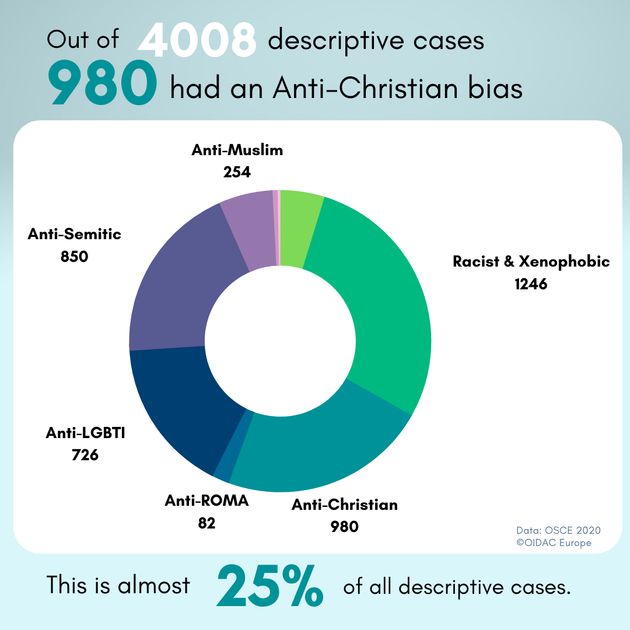
An OSCE report shows that graffiti, vandalism and arson attacks against churches are some of the more common crimes. There are 70% more cases reported than in 2019.
The Office for Democratic Institutions and Human Rights (ODIHR) of the Organisation for Security and Co-operation in Europe (OSCE) has launched its Hate Crime Data 2020 on 16 November, the International Day for Tolerance.
The ODIHR collects data from states, governments statistics, civil society, international organisations and UNHCR and OSCE missions.
The organization's hate crime database is the “largest of its kind worldwide. It is updated each year and it also includes data on hate crime legislation, prosecution and sentencing, as well as best practices and resources and tools to support victims”.

Photo: Krisztian Matyas, Unsplash, CC0
What is hate crime?
According to ODIHR, “hate crimes are criminal acts motivated by bias or prejudice towards particular groups of people. They comprise two elements: a criminal offence and a bias motivation”.
“A hate crime has taken place when a perpetrator has intentionally targeted an individual or property because of one or more identity traits or expressed hostility towards these identity traits during the crime”, they add.
The report looked at different categories of hate crimes: Racist and xenophobic hate crime, Anti-Roma hate crime, Anti-Semitic hate crime, Anti-Muslim hate crime, Anti-Christian hate crime, Other hate crime based on religion or belief, Gender-based hate crime, Anti-LGBTI hate crime, Disability hate crime.
Hate crime against Christians
The European body explains that the hate crime against Christians “are influenced by a number of factors, including the minority or majority status in a given territory, the level of recognition of particular religious groups in a given country, or political and media focus on these groups at a particular moment”.
“ODIHR's hate crime reporting includes reports of physical assaults and murders. Graffiti and vandalism against places of worship, the desecration of cemeteries and arson attacks against churches are some of the more common types of crimes motivated by bias against Christians”, underlines the report.

Data: OSCE. Graph: Observatory of Intolerance and Discrimination against Christians in Europe
For example, in France, the arsons against churches has significantly increase, and in Scotland, the problem is so great that the church is now receiving financial support, from a hate crime fund, to improve its security measures.
In addition to the data, since 2004, “OSCE Ministerial Council decisions and declarations have included specific commitments on and references to the importance of combating prejudice, intolerance and discrimination against Christians”, says the ODIHR.
980 crimes in 2020
In 2020, the ODIHR received a total of 7,181 cases of hate crimes against different kinds of groups and individuals. 4,008 of them were descriptive cases and the rest were police data from individual member states.
Of those 4,008 descriptive cases, 980 are hate crimes against Christians, almost 25%, more than against any other religious group. There has been an increase of almost 70% comparing the numbers of incidents from last year to the number of this year.

Data: OSCE. Graph: Observatory of Intolerance and Discrimination against Christians in Europe
However, a group monitoring religious freedom in the continent, the Observatory of Intolerance and Discrimination against Christians in Europe (OIDAC), stresses that “only 11 countries report data on hate crimes against Christians [..], and of the 136 civil society organisations that provided descriptive data, only 8 organisations consistently reported incidents against Christians,so that this obviously distorts the statistics significantly”.
“Both of these findings put the reality of the situation into a different perspective, which indicates that the actual number of hate crimes against Christians is probably way higher”, they add.
Source: Evangelical Focus





